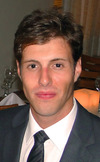JOIS 4 4 Authors
The Journal of Investment Strategies
Volume 4, Issue 4
Christopher Stephens
Chris Stephens is a Professor at the C3 - Centro de Ciencias de la Complejidad and the Institute for Nuclear Sciences of the Universidad Nacional Autonoma de Mexico. After receiving his undergraduate degree at The Queen's College, Oxford he completed his graduate work at the University of Maryland in the area of theoretical physics. He is a founding partner of Adaptive Technologies Inc. and Presage Research, research companies dedicated to the application of artificial intelligence research to business and industry, including agent-based technologies and advanced data-mining techniques. He is author or co-author of over 120 publications and his work has been cited over 1700 times. He has given over 140 invited lectures in more than 20 countries. Among the academic honors he has received is the Jorge Lomnitz Prize of the Mexican Academy of Sciences and a Leverhulme Professorship from the Leverhulme Trust, UK. He is also a member of the editorial board of Genetic Programming and Evolvable Hardware. |
|
|
|
Didier Sornette
Didier Sornette is professor of Entrepreneurial Risks in the department of Management, Technology and Economics at the Swiss Federal Institute of Technology (ETH Zurich), a professor of finance at the Swiss Finance Institute, and is associate member of the department of Physics and of the department of Earth Sciences at ETH Zurich. He uses rigorous data-driven mathematical statistical analysis combined with nonlinear multi-variable dynamical models including positive and negative feedbacks to study the predictability and control of crises and extreme events in complex systems, with applications to financial bubbles and crashes, earthquake physics and geophysics, the dynamics of success on social networks and the complex system approach to medicine (immune system, epilepsy and so on) towards the diagnostic of systemic instabilities. In 2008, he launched the Financial Crisis Observatory to test the hypothesis that financial bubbles can be diagnosed in real-time and their termination can be predicted probabilistically. The Financial Crisis Observatory now delivers daily an extensive survey of +25000 assets worldwide and a summary cockpit of the main positive and negative bubbles developing in all asset classes. Since 2012, his group has developed InnovWiki, an original collaborating platform where users can openly collaborate and contribute to various ideas/projects, combined with a prediction market to facilitate quality assessment of various ideas/projects based on a wisdom of the crowd approach, and empowered by a tools repository and data visualisation softwares. |
|
Emmanuel Jurczenko
Emmanuel Jurczenko is Associate-Dean at Ecole Hôtelière de Lausanne that he joined in 2015. He was previously Associate Professor of Finance at ESCP-EUROPE. He graduated in Economics and Finance, and holds a Ph.D. in Economics from University Paris 1 Panthéon-Sorbonne. He has published several articles in academic journals, edited books with John Wiley&Sons and Elsevier, and serves as a referee in several international leading journals. His research focuses on Risk budgeting, Factor-based Investing and Alternative Investments.
|
|
Guilherme Demos
Guilherme Demos is currently a PhD candidate in the department of Management, Technology and Economics at the Swiss Federal Institute of Technology (ETH Zurich). Working in Professor Didier Sornette's research group, he focuses on the application of the latest mathematics and machine learning methods to improve the resilience of out-of-equilibrium complex systems such as financial markets. |
|
|
|
Henri Waelbroeck
Henri Waelbroeck, Ph.D., serves as global head of research at Portware LLC, where he leads the team behind Portware's intelligent EMS (execution management system). After his PhD at the University of Texas at Austin in 1990, he served as Research Professor at the Institute for Nuclear Sciences at UNAM, Mexico, publishing in a range of topics from Quantum Gravity to Neural Networks, Molecular Evolution and Genetic Algorithms. In 1997 he co-founded Adaptive Technologies, Inc. which sold the world's first agent-based system aiming to identify and exploit predictability bubbles in stock prices. Henri moved to New York in 1999 to find innovative ways for institutions to source liquidity more efficiently. Currently Henri is applying big data techniques and market impact science to help institutional trading desks maximize alpha capture. |
|
Jérôme Teiletche
Jérôme Teiletche is Managing Director and Head of Cross Asset Solutions of Unigestion that he joined in 2014.Jérôme began his career in 1999 as an Economist in the Forecasting Directorate at the French Ministry of Finance in Paris. In 2001, he joined Natixis CIB as Strategist-Economist focusing on Global Asset Allocation issues and became Senior Quantitative Analyst at the Alternative Investment Division of Societé Generale Asset Management in 2006. Since 2008, Jérôme worked for Lombard Odier Investment Managers as Head of the Solutions Group, leading all multi-asset and single-assets systematic investment strategies. Jérôme holds a Ph.D. in Economics from Bordeaux University. Jérôme has taught at various universities and has authored in numerous academic and practitioner journals and books.
|
|
Peter Cauwels
Peter Cauwels obtained his PhD at Ghent University in 2001, specializing in the field of environmental, radiation and nuclear physics. After that he worked 10 years in the banking industry taking up senior roles in risk and portfolio management and quantitative research. From 2011 until 2014 he was a full time senior researcher at the chair of Entrepreneurial risk at the ETH in Zurich. Currently, he combines his passion for research with his passion for investment. Since 2014, he is Managing Partner at Vermec. That is a professional family office that provides long-term capital to ambitious mid-sized enterprises and projects. Parallel to these PE/VC investments, Vermec manages a liquid portfolio of different types of assets in a broad range of sectors and geographical locations. In addition, he is associated as a guest researcher at the chair of Entrepreneurial risk at the ETH in Zurich. The mission of this group is to better understand the challenges that our society is facing using a multi-disciplinary approach mixing physics, finance, computer science and economics. |
|
|
|
Qun Zhang
Qun Zhang is an academic visitor in the Chair of Entrepreneurial Risks in the Department of Management, Technology and Economics at the Swiss Federal Institute of Technology (ETH Zurich) under the direction of Prof. Sornette since 2014, supported by Guangzhou Elites Project of Guangzhou Municipal Government. She is also a Ph.D. candidate in Management Science and Engineering at the South China University of Technology (SCUT), Guangzhou, P.R. China, within a Successive Postgraduate and Doctoral Program after two years postgraduate study in the School of Science (2010-2012). Her research interests are now primarily in the diagnostic of financial bubbles, the prediction of extreme events, and the interdisciplinary study of complex financial systems. |
|
|
|
Thierry Michel
Thierry Michel is portfolio manager at Lombard Odier Asset Management. His activity of research is focused on financial econometrics, with topics such as risk measures and optimization in the service of portfolio construction and risk budgeting. |
|
|
|
Vladimir Filimonov
Vladimir Filimonov is a Senior Researcher at the Chair of Entrepreneurial Risks, Department of Management, Technology and Economics of ETH Zurich. His research passion is quantitative finance and in particular high-frequency finance and market microstructure with a deeper focus on algorithmic and high-frequency trading. His works about quantification of the degree of self-excitation in financial markets were highlighted by the United Nations and |
|
Nataliya Bershova
Nataliya Bershova is a Director of Execution Research of Sanford C. Bernstein and is responsible for quantitative execution research that supports the global electronic equity trading strategies. Her areas of expertise are market structure, electronic trading and trading systems. Prior to joining Sanford Bernstein in 2012, Mrs. Bershova served as a quant trader at Alliance Bernstein's buy-side equity trading desk. She received her Ph.D. in financial economics from CUNY, Graduate Center. She also holds M.S. in Applied Mathematics and Mechanics from Moscow State University, Russia. Mrs. Bershova is the co-inventor of a trading pattern on methods and systems related to securities trading. She has publication on equity market microstructure topics in academic journals.
|










